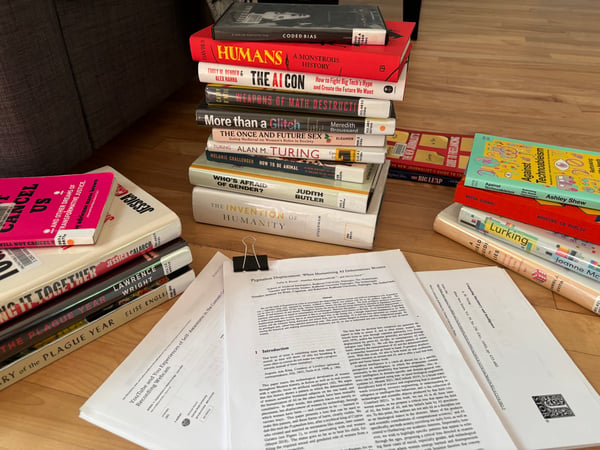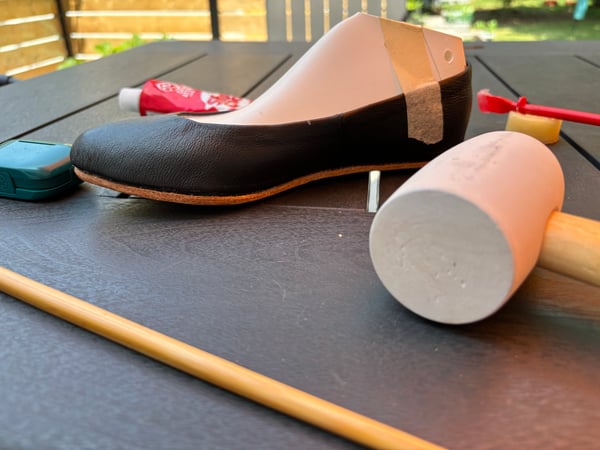I'm a [scope] creep, I'm a weirdo...
Howdy, friends!
Remember last time, how recklessly confident I sounded that I was, like, thisclose to shipping the cone winder and its associated video? Suuuure, I had thought it was cursed but that was all in the past now and all that remained was the trivial task of, uh, [checks notes] adding "small details".
There is still probably a cone winder video on the way, but at this point it's unlikely to bear a lot of resemblance to the thing I thought I was making when I started trying to prepare it back in October/November. I had to finally admit that, aside from broken bones and major life events, a big part of the reason it was taking so long is that I just... really didn't feel good about sharing it. And before I could confidently move forward, I needed to understand why, why has this one been such a damn joysuck compared to previous projects, and perhaps to answer Radiohead's question, implied by the subject line of this email: what the hell am I doing here?
Getting in touch with one's feelings obviously demands a bibliography so I made several trips to the public library and local book shops about it:

OK, to be fair, not all of these are directly related to what I'm writing about the cone winder project; many are earmarked for either the making-art-during-a-pandemic WIP or other potential future boondoggles.
I also haven't read all of these yet, and thus can't vouch for every title pictured, but I thought it might be fun to share some insight into what I have been digging into lately.
Reading
(Links are provided where possible for reference only; none are sponsored or affiliate links. If you do check any of these titles out, please consider buying from your local independent book store, or supporting your local library!)
Working In Public: the making and maintenance of open-source software by Nadia Asparouhova (published under a previous name)
This is one of a couple of books that I'll probably devote the most explicit discussion to in the eventual video, but even then I don't think I'll be able to convey the depth of it, nor how much it helped me organize my thinking about creating stuff for an online audience. Although the book focuses on open-source software development, Asparouhova frequently highlights how much that work has in common with other platform-dependent creative jobs, and I found it had a lot to offer me not just as a rookie maintainer and new-ish YouTuber, but also as a consumer of independently-created media.
Tell Everyone: why we share and why it matters by Alfred Hermida
This one isn't pictured because I actually returned it before finishing. After reading Working In Public, I was looking for more discussion about why we "share" original content online, but this book (or at least the part I read) turned out to be more about resharing: what makes a post or piece of news spread widely, go viral. Not quite what I was looking for at the time. And, while I'm not exactly immune to getting sidetracked by something completely tangential to the task at hand1, the writing just didn't really grab me enough to keep going. So back into the returns slot it went, though I might pick it up again later.
Lurking: how a person became a user by Joanne McNeil
Now this writing grabbed me. The first chapter, "Search", made an especially big impact on the shape of my current script draft.
One niche complaint I have is that this book has the most bizarre referencing style I have ever encountered–instead of associating sources with their respective line or page of the main body text, each chapter has one giant, dense wall of "notes" without line breaks, like a stream-of-consciousness journal. You probably will not care about this unless you, too, are writing a video essay whose scope is ballooning wildly beyond its original outline.
Against Technoableism: rethinking who needs improvement by Ashley Shew
I vibed with this so hard that I bought my own copy so that I wouldn't bogart the library's indefinitely; I have a feeling I'll return to this often. I know "technoableism" sounds jargon-y but don't let that deter you: it's a short and very approachable book but packs a lot in.
A Field Guide To Lies by Daniel Levitin
Overall, I thought this was a pretty fun read. It didn't make me an expert in expertise, and I fear I will never see eye to eye with behavioural economists about practical applications of probability when it comes to making small talk with strangers at house parties2, but maybe it helped heal the trauma of crying through my Discrete Mathematics final. In honour of Glenn Kessler fulfilling the prophecy I'm gonna suggest you take the section on "fact checking" with a grain of salt, though.
"Computing Machinery and Intelligence" by Alan M. Turing
I first read this one two or three years ago for a university course and the memory of it has been slowly driving me mad ever since so I had to read it again to make sure I wasn't hallucinating stuff to get agitated about. Nope! Popular reiterations of the "Turing test" did not prepare me for how, uh, outta pocket the primary source is.
Algorithms of Oppression by Safiya Umoja Noble
(e-book; not pictured)
This is a heavy read and it would be a stretch to say I "enjoyed" it but I do think it's important, and (unfortunately) perhaps even more relevant now than when it was published.
Given that the book spends considerable time discussing pornography, and especially in light of, e.g. Free Speech Coalition v Paxton, last week's itch.io shadowbanning spree, and the UK's age verification scheme going into effect, I think it's worth keeping in mind that anti-porn content moderation policies, whether in the hands of private or public decisionmakers, can also be weaponized against marginalized populations; classifying (algorithmically or otherwise) what is and isn't "sexual" or "obscene" isn't straightforward, but it can be a convenient way to excuse plenty of censorship, discrimination, surveillance, and chilled speech, and to conflate specific identities with "harmful" content. This doesn't discount any of the harms Noble identifies; in fact, I think it's a different expression of many of the same underlying problems.
On that cheerful note, let's hard cut to: shoes! I floated the idea of making a process video and that's still in the four-question-marks-in-a-trenchcoat phase of development, but I can share a lil peek at my first (very) rough mockups on my bespoke 3D printed lasts:

So far I'm pleased with the fit: they could use a tiny bit more height in the toe box, especially on the left, but I think I'm more or less on the right track when it comes to capturing shape and volume distribution to avoid my usual pain points. I have done a couple of solid cross-town walks in these without rubbing or blisters, but mostly I've been wearing them around the back garden, which is not really enough to assess long-term wear or comfort. The real test will have to be on the next pair, when I plan to add a bit more internal structure to the toes and heels, include the 10mm heel elevation the last is designed for, and use a more appropriate leather for the outsoles.
Until next time,
xoxo Sparks
-
In fact this very book did temporarily hijack my brain for a couple of days with an offhand, uncited factoid. I managed to talk myself out of suddenly dropping everything to pursue graduate studies in Media Psychology but I do still have a large number of mostly paywalled tabs open. Anyway, if anyone has access to this paper I'd love to read it. ↩
-
Look, if you tell me that 21 of 30 people at the party are engineers and the rest are writers, it's not that I don't understand the math, I just think it's contextually irrelevant: calculating the exact odds offers nothing more useful to guide my behaviour when I interact with this specific human being standing in front of me than if it were, in fact, 50-50; I'm still going to ask "what do you do?" instead of guessing because talking to a person isn't gambling and I'm not trying to "win" the party. ↩